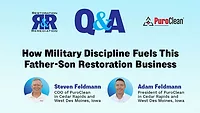Why I Love This Business

Insurance restoration has a high burnout rate. Contractors already stressed about costs, subcontractors and schedules often find themselves unable to cope with the special needs of distressed property owners. Such people are not easy clients, and the restoration contractor must become a trusted adviser as well as an expert builder. For many, the payoff is not worth the hassle and, when the economy improves, they will move to other fields.
I’ve seen trends and people come and go during the past 42 years. Yet I am still excited to get up in the morning and go to work. I’ve listed a few basic truths I think people in insurance restoration need to recognize over the long term; undoubtedly you can think of others.
You have to love helping people solve their problems. We work with vulnerable clients who may never have suffered a major loss before, and likely feel victimized. On good days they will be edgy, emotional and indecisive. On the bad days you will bear the brunt of their frustrations just because you are there and asking them questions.
Insurance restoration professionals must develop thick skins, infinite patience and even temperaments. If you do not enjoy these challenges, another profession may suit you better.
Your word is your bond. People judge you by their first impression and they trust you based on how well you follow through. Taking care to reach clear understandings and avoid unrealistic promises is vital to your success. People will tolerate occasional mistakes if you have their confidence and trust. If you cannot gain that trust, move on to another job or another profession.
Some clients are lost causes. We’ve all worked with people whose outlook is so dismal that we can do nothing to change their perspective. Good clients who are stressed may lash out at you occasionally, but negative clients are consistent: their sour attitude endures from the beginning to the end of the relationship. In such cases, leave sooner rather than later and wish the next guy luck.
You cannot let technology replace personal contact. Despite all of the communication technologies at our disposal, face-to-face contact remains the best way to connect with others. Your body language, facial expressions and voice tones all carry meaning. Those who try to build relationships more efficiently by using technology may find that the same technology works to their disadvantage if a client becomes disgruntled. While technology makes us more efficient, there is no substitute for the necessary personal contact.
You must keep learning. When I first entered this business, there were no faxes, emails, personal computers or cell phones. We had to rely on notes scribbled on yellow legal pads. Today, technology changes at a dizzying pace and each innovation has its own learning curve. Realize that change is inevitable and new developments bring new opportunities. If you are not learning every day, you are moving backward.
You must try to influence change. As mentioned above, change is inevitable. If we step aside and let development occur without our participation, we are relinquishing our ability to have any impact. We must use our influence to bring about positive effects from change.
You must be a mentor to others. The seniors in this business won’t be around forever, and it is our responsibility to invest time mentoring the new industry leaders. We have much to share based on our experience with customer service and professional behavior, and it is our duty to help our successors embrace the values that are most lasting and can be most easily lost.
Looking for a reprint of this article?
From high-res PDFs to custom plaques, order your copy today!







